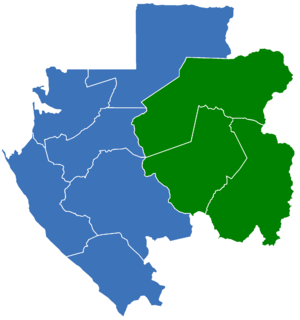Gabonese presidential election, 2016
|
|
|||||||||||||||||
|---|---|---|---|---|---|---|---|---|---|---|---|---|---|---|---|---|---|
|
|||||||||||||||||
|
|||||||||||||||||

provinces won by
■ – Ali Bongo Ondimba ■ – Jean Ping |
|||||||||||||||||
|
|||||||||||||||||
■ – Ali Bongo Ondimba
Presidential elections were held in Gabon on 27 August 2016. Incumbent President Ali Bongo Ondimba ran for re-election and was challenged by former Minister for Foreign Affairs Jean Ping. On 31 August, the electoral commission proclaimed Bongo's re-election with a margin of less than two per cent. Protests broke out in the capital Libreville after the results were announced.
The President of Gabon is elected for a seven-year term in a single round of voting by plurality; whichever candidate places first is deemed elected, regardless of whether the candidate secured an absolute majority of votes. This system is thought to be a disadvantage to the fractious opposition, which would appear to have little chance of winning unless it united behind a single candidate.
Nineteen prospective candidates submitted applications to stand, and the Autonomous and Permanent National Electoral Commission (CENAP) announced on 15 July 2016 that 14 of them had been deemed eligible. President Ali Bongo Ondimba announced in Port-Gentil on 29 February 2016 that he would stand for re-election. CENAP approved the candidacy of President Bongo despite a long-standing controversy about his eligibility; his opponents claimed that he was not Gabonese by birth and was an adopted rather than biological son of Omar Bongo. Due to the presence of representatives of the opposition, there was no consensus regarding Bongo's candidacy, and it was therefore approved by majority vote.
Jean Ping, a prominent diplomat standing as the candidate of the Union of the Forces of Change, and viewed by some as Bongo's most serious challenger, was also approved to stand. The other candidates to be approved were Casimir Oye Mba of the National Union, Paul Mba Abessole of the Rally for Gabon, Pierre Claver Maganga Moussavou of the Social Democratic Party, Augustin Moussavou King of the Gabonese Socialist Party, and several independent candidates: Guy Nzouba Ndama, Raymond Ndong Sima, Bruno Ben Moubamba, Laurent Désiré Aba'a Minko, Gérard Ella Nguema, Abel Mbombe Nzoudou, Dieudonné Minlama Mintogo, and Léon Paul Ngoulakia.
...
Wikipedia


